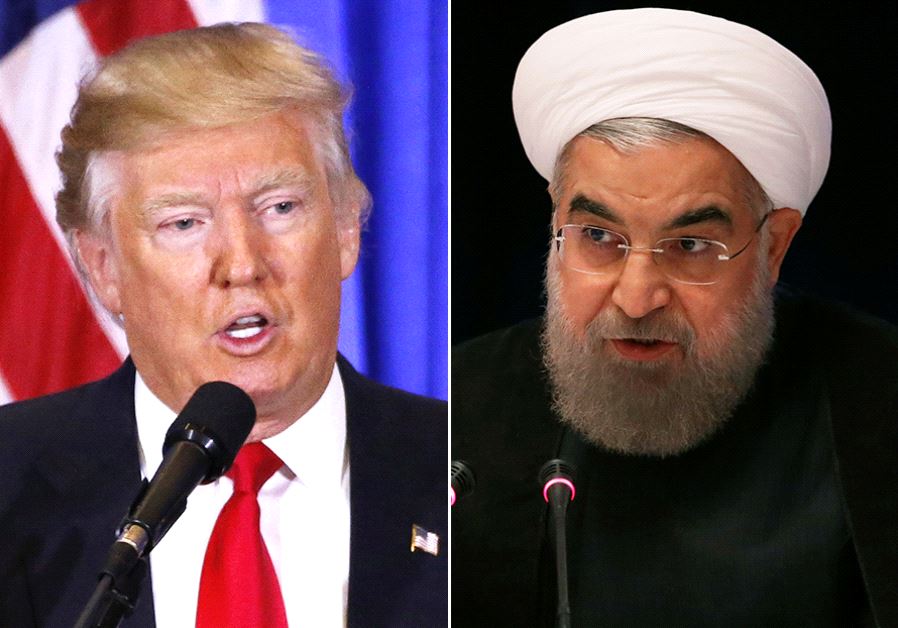U.S. assures Israel of no change in Iranian policy after Trump offer

Trump and Rouhani. (photo credit: REUTERS)
Washington has assured Israel there has been “no change” in its “aggressive policies” toward Iran, a diplomatic official said Tuesday following US President Donald Trump’s surprise announcement that he would be willing to meet Iranian President Hassan Rouhani without any preconditions.
According to the official, Israel is “in continuous contact” with the American administration.
Nevertheless, neither the Prime Minister’s Office nor the Foreign Ministry issued any public comment on the suggestion, made by Trump in an answer to a journalist’s question during a press conference following a meeting with Italian Prime Minister Giuseppe Conte.
Trump, when asked if he would meet Rouhani following his recent meetings with the leaders of North Korea and Russia, said: “I’ll meet with anybody. I believe in meeting… There’s nothing wrong with meeting.”
Trump added that he did not know if the Iranians were “ready yet” for a meeting, adding that “they’re having a hard time right now.”
It is precisely because Iran is having a hard time – with the rial at record lows, galloping hyperinflation and protests in the streets – that some Israeli officials believe a meeting now would be a mistake and bad for Israel.
“The Iranians are on the mat right now,” one official said, using a wrestling analogy. “This would let them up, without getting anything in return.”
The official said that one “precondition” Trump might want to consider before a meeting would be for the Iranians to “stop threatening to destroy America’s closest Mideast ally.”
(function(w,d,s,i){w.ldAdInit=w.ldAdInit||[];w.ldAdInit.push({slot:10834723912266086,size:[0, 0],id:”ld-9628-9059″});if(!d.getElementById(i)){var j=d.createElement(s),p=d.getElementsByTagName(s)[0];j.async=true;j.src=”//cdn2.lockerdomecdn.com/_js/ajs.js”;j.id=i;p.parentNode.insertBefore(j,p);}})(window,document,”script”,”ld-ajs”);
Former president Barack Obama let Iran “off the mat” by signing the nuclear deal at a time when Iran was reeling from sanctions, and a meeting now would do the same thing, the official said.
Not everyone, however, agrees with that assessment. Former Foreign Ministry director-general Dore Gold said that whether a meeting would be tantamount to letting the Iranians off “the mat” would depend on whether Trump would change his newly initiated sanctions policy. Trump, in May, withdrew from the Iranian nuclear agreement.
“I don’t think the US would fundamentally change its approach on Iran sanctions, unless Iran made certain concessions,” said Gold, head of the Jerusalem Center for Public Affairs.
Gold cautioned against making “too much” out of the meeting proposal.
“In moments of political military tension, there are many times when ideas are floated for a meeting; sometimes they work out and sometimes they don’t,” he said.
“I think the US has had a very comprehensive agenda on Iran,” Gold added. “I don’t believe that a meeting between Rouhani and Trump would only deal with the number of centrifuges spinning – in other words, the regional role of Iran has been very much on the administration’s agenda, and would be on the agenda of such a meeting, including the withdrawal of Iranian forces from Syria.”
If that is the case, Gold was asked, then might not such a meeting serve Israel’s interests and be something that Jerusalem should want?
“This is a US decision,” he replied. “The US is the guardian of the sea routes around the Arabian Peninsula, both in the Persian Gulf and the Red Sea. Its ships have been under threat from Iran land-based weapons, and it has every right to employ all the means at its disposal to deal with the emerging crisis in these middle-eastern waters… if it uses a mixture of military deployment and diplomatic rhetoric – I’m certain that Trump knows what he’s doing.”
While Obama never met Rouhani – Supreme Leader Ali Khamenei was opposed to the idea – the two did speak on the phone in September 2013 for what was billed as a “historic” phone call, and the first such call since the Iranian Revolution in 1979.
A week later, Prime Minister Benjamin Netanyahu – who was in the US attending the UN General Assembly meetings – said in separate interviews with CNN and NPR that he would accept a phone call from Rouhani – and that if Rouhani offered to meet him, he would consider it.
On Monday, China’s envoy on the Syrian issue Xie Xiaoyan suggested that Netanyahu meet with the Iranians, saying that if Trump could meet with North Korean President Kim Jong Un – as he did in June – then Netanyahu could meet with Iran’s leaders.






Comments are closed.